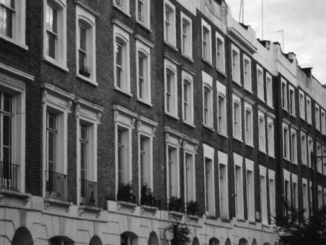
Anarchist riot in Chicago,
T. de Thulstrup via the Library of Congress – Public domain CC BY-SA 2.0
Only the nieve might think the nighttime streets of 1894 Soho, a den of immigrants and nere-do-goods, were not already alive with talk of the events of the previous chilly February afternoon. Passers-by investigating an explosion at Greenwich at the other end of Town to Soho found a well-dressed man coated in blood. His left hand is blown off. The face and body covered in wounds. The stomach is torn open. Part of the intestine protrudes.
After discovering a membership card on the victim, in the evening Inspector Melville and the Special Branch raid the Club Autonomie in Great Windmill Street off Tottenham Court Road. Despite leaving without making any arrests, enough intelligence is gathered to put a name to the unfortunate bomber – Martial Bourdin. At midnight, a detective is dispatched to dingy premises in nearby Great Titchfield Street.
Upon arrival, the bomber’s brother, Henri Bourdin, a tailor, is interrogated. The siblings came to this country from Paris several years earlier with Martial returning to the French capital once or twice since then. From about the age of 16, Martial worked for his brother and became an accomplished journeyman ladies’ tailor. The deceased worked alongside Henri but not so much more recent to the explosion.
Henri reported his sibling was not badly off and was said to have money. A Catholic of no deep religious convictions, Martial had no chemical or mechanical pursuits his brother knew of. Neither any political views or connections with anarchism, but Henri did recall him attending lectures at St Georges Hall and the British Museum Reading Room.
In reality, after a year or two in London, Martial did come under the influence of anarchists. Three years prior to 1894 he had journeyed to America and when in New York he both wrote and spoke in favour of their gospel. After working there and earning up to £4 a week, he returned to Paris and moved back to London in December of 1893 – only weeks before the fateful excursion to Greenwich. Well-educated and a fluent English speaker, following the return he tailored again for his brother but became reticent with friends.
Having never known his sibling to threaten others or mention suicide, Henri last encountered Martial on the 15th of February, the day of the explosion, at the Great Tichfield Street premises. Martial remained only a few minutes and did not say where he was going. He asked for work, but his brother had none. Martial had £40 in his possession after his return from America months ago.
For in the 1890s a global network of anarchists emerged uniting revolutionary thinkers and activists from France, Britain, and the United States. They were driven by shared ideals of anti-capitalism, anti-authoritarianism, and a desire to dismantle ‘oppressive’ state structures. The French movement, based in urban centres like Paris, was intellectual but also connected to the struggles of the working class through syndicalism and militant trade unions.
Mirrored in the UK, anarchists here brought the critique of capitalism and imperialism to the British working class. The London-based anarchist press played a pivotal role in connecting such circles across national borders, distributing radical ideas and fostering international solidarity amongst such villains.
In the United States, the decade witnessed the rise of both intellectual and grassroots anarchist movements making the U.S. a hub for anarchism in the English-speaking world. Widespread labour unrest influenced many to embrace the ideology in immigrant communities in cities like New York and Chicago. Inspired by anarchist literature, these activists were influenced by the idea anarchism was not only a political theory but a practical means of improving workers’ lives through direct action.
By the mid-1890s, these transatlantic networks were well-established, with anarchists engaging in cross-continental correspondence, organizing international conferences and supporting various revolutionary movements, thereby solidifying a dynamic, interconnected and dangerous global community.
Although apparently acting alone, the suspicion must have arisen to Inspector Melville that Martial Bourdin was part of a well-funded and well-organised global conspiracy. Martial banked with a private bank in Fitzroy Square. Although his brother knew nothing of a membership of any Autonomie Club, he was aware of the five-month-long trip tailoring in America which earned Martial £4 a week. Ordinarily he earned only 45s a week from his brother when in London. However, good at his trade, he sometimes made up to three guineas.
The investigation moved to 30 Fitzroy Street, to the house of a Mr Ernest Delbacy where Martial Bourdin lodged. His landlord last remembered seeing the deceased at 10 pm on the night of the 14th. Mr Delbacy was ignorant of any visits to the British Museum and could not account for his lodger travelling to Greenwich. The deceased always had money and at one time lent his landlord £20. Mr Delbacy never noticed any explosives. He would not have allowed Bourdin to lodge if he suspected him of making a homemade bomb.
As the investigation progressed, Inspector Melville of the Special Branch was able to provide the penny dreadful newspapers with a perhaps unlikely narrative. On the day of the explosion, Martial Bourdin dined with friends at his usual cafe in London’s Tottenham Court Road district. In the afternoon he was seen talking to a man on Hannover Street, which lies off Regent Street about halfway between Tottenham Court Road and Charing Cross via a circuitous route avoiding Soho.
The two parted with Bourdin proceeding to Charing Cross. The non-Metropolitan may need to be reminded that this is the Underground and mainline railway station nearest to Trafalgar Square, and a short walk along Whitehall from Westminster.
At some point during the day, someone he met provided a bomb and expenses for a journey to Paris. Thus provisioned, Bourdin would take a ticket from Charing Cross to Dover. At the port, luggage would be provided to avoid suspicion from the French authorities when he arrived by boat on the other side of the Channel. From the French coast he would proceed to Paris and use his bomb.
However, at Charing Cross he became excited as if he thought he was being followed by a detective and took the tram to the first place he could think of which was Greenwich. At Greenwich, he took another fright and rather than not waste the bomb, asked for directions to the nearby park to blow up the Royal Observatory instead.
A suspicion the detour might be to allow the bomb to be hidden and used on another occasion was poo-pooed by the papers because of the preparation required for a detonation. The ingredients, if indeed provided by ‘someone he met’, would need to be made up at the scene. Sulphuric acid would have to be placed into a glass tube filled with cotton wool with the tube then inserted into a hole prepared for it in the mouth of the bomb. Thereafter, the acid would soak through to the glass, explode and set off the main charge.
The counter-argument being the instability of home-brewed explosives removed the need for any fuse, with disastrous consequences for Martial Bourdin. As for the veracity of Melville’s narrative, if one suspects it far-fetched and disjointed, it might raise the suspicion that something was being withheld to further the Special Branch inspector’s long-term objective. He did have form.
To be continued…
© Always Worth Saying 2024



